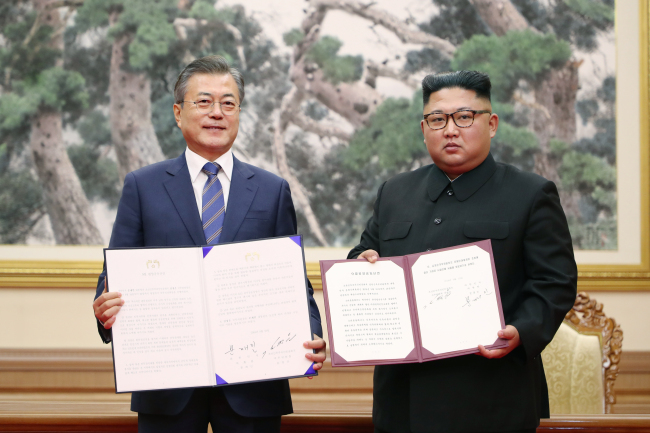With North Korea reaffirming its willingness to denuclearize, such as by agreeing at the third inter-Korean summit Wednesday to allow in nuclear inspectors, expectations have been raised for economic cooperation between the two Koreas, including the resumption of operations at a joint industrial park and the connection of railways.
At a joint news conference in North Korea on Wednesday, the two leaders, Moon Jae-in and Kim Jong-un, vowed to end hostilities and move toward a nuclear weapons-free peninsula.
With their pledges to usher in a “new era of peace and prosperity,” they agreed to resume tourism at Kumgangsan and to revive the Kaesong industrial park. The two leaders also agreed to have a ground-breaking ceremony to connect the two Koreas by modernizing the Gyeongui Line and the Donghae Line this year and to review the creation of economic zones along the West Sea and the East Sea.
But despite the promise of future cooperation, experts say there was no meaningful announcement about economic cooperation, as the economic agenda remains constrained by sanctions against North Korea, limiting its overseas business activities.
“If the two Koreas want to work together in the areas of infrastructure beyond the Kaesong complex and the Kumgangsan project, the decision cannot be done solely by them,” Lee Boo-hyung, a senior analyst with the Hyundai Research Institute, told The Korea Herald.
For that to happen, the North needs to achieve a major relaxation of sanctions by the United Nations. The ball is hence passed, Lee said, possibly to be picked up at a future summit between the US and North Korea.
 |
President Moon Jae-in of South Korea, left, and North Korea’s leader, Kim Jong-un, during a signing ceremony in Pyongyang, North Korea, on Wednesday. (Pyeongyang Press Corps) |
A meeting between US President Donald Trump and Kim has not yet been confirmed, but is expected to take place now that the North has expressed its willingness to denuclearize, according to experts.
Right after the joint announcement by Moon and Kim, Trump said on Twitter that it was “very exciting” that the North had agreed to permanently dismantle its main nuclear complex.
“Kim Jong-un has agreed to allow Nuclear inspections, subject to final negotiations, and to permanently dismantle a test site and launch pad in the presence of international experts. In the meantime there will be no Rocket or Nuclear testing,” Trump said.
The tweet raised the question of whether the US and South Korea had discussed the announcement before the summit. Yoon Young-chan, senior secretary to the president for public communications, said, “I do not know details but we have long been closely cooperating with the US and we will do so more closely to resolve (the issues).”
A day earlier, he had said the two sides could pursue economic cooperation if there were a new set of conditions, adding that he hoped the event would ease relations between Washington and Pyongyang.
Although there were no clear results in terms of economic cooperation, the underlying message from the South can be found in the visit by the leaders of conglomerates and public companies, according to Lee Suk-ki, a researcher at the Korea Institute for Industrial Economics and Trade.
“Through the economy meeting, the South wanted to send a message to the North that (once real cooperation begins) we can make a big investment in the North,” Lee said.
A day earlier, 17 South Korean business leaders, including the chiefs of Samsung, SK and LG, met with Ri Ryong-nam, the North’s deputy prime minister. During the 1 1/2-hour meeting, the business leaders briefly introduced themselves, and some expressed hopes of closer economic cooperation between the two Koreas in the future.
During the meeting, Ri showed interest when Korea Railroad Corp. CEO Oh Young-sik expressed his hope of connecting the railways of the two Koreas upon restoration of the relations between the two sides and upon achieving peace on the Korean Peninsula.
Ri told Oh, “Currently, cooperation on the railway is the most important for the North and South. (You) would have to come (to the North) every year in the future,” evoking bursts of laughter from others in attendance.
There were concerns that the business moguls were Moon’s “sidekicks” at the summit, but experts said their visit was meaningful as a tool to push the North and also to help the business moguls better understand the North.
Yang Moo-jin of the University of North Korean Studies in Seoul said their visit sent two messages: pushing the North to denuclearize and envisioning the future of the North’s economy through cooperation.
South Korea’s Ministry of Land, Infrastructure and Transport has set aside 2.3 trillion won ($2.05 billion) for possible cooperation on infrastructure in the North.
From the perspective of the business leaders, their visit to Pyongyang is also a good opportunity for the companies in the longer term, as the meeting with the North’s top economic officials helped them better understand the current economic situation in the regime.
Um Chi-sung, an executive with the Federation of Korean Industries, said, “For Korean business leaders, the visit to the North is a good opportunity to understand what the North’s top economic officials have in mind. It will help them develop plans for economic cooperation after denuclearization.”
By Shin Ji-hye (
shinjh@heraldcorp.com)








